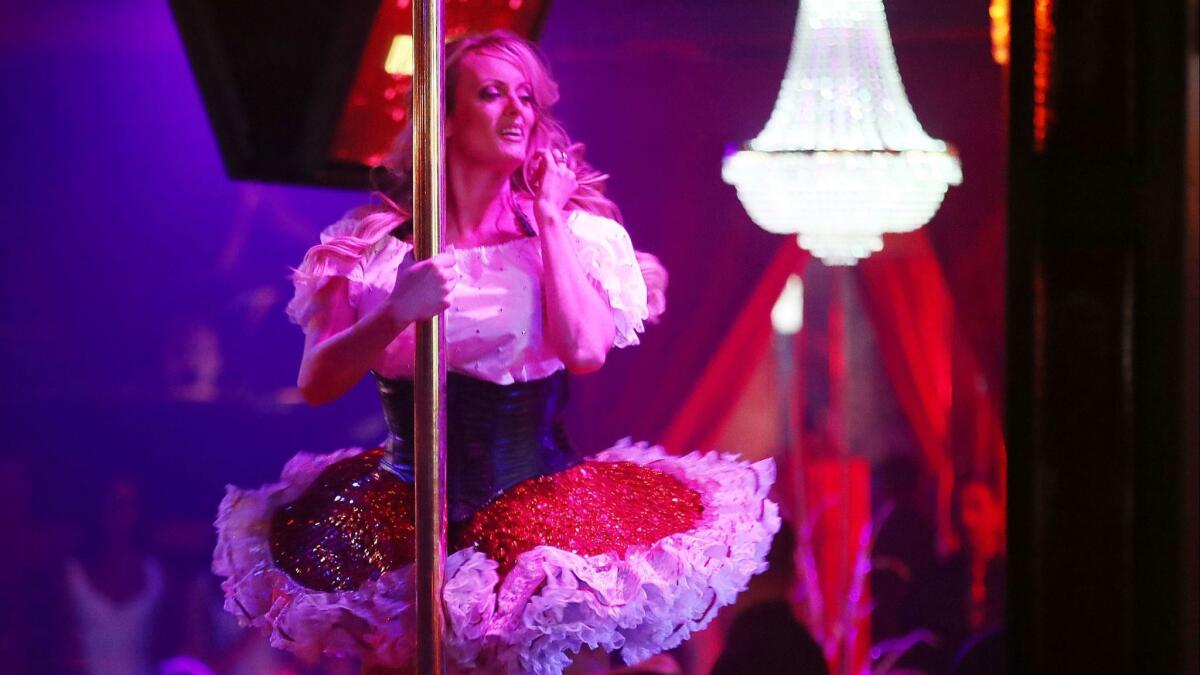Op-Ed: Stormy Daniels: Strippers need to be treated as freelancers, not employees

- Share via
At most strip clubs, including the ones I’ve worked at throughout my career as a stripper, dancers work as independent contractors who set their own hours. They show up for work on the days they are able to, allowing them to give priority to things like writing a term paper, studying for a test or putting their children to bed at night.
When I started dancing, I was a student, and being able to set my hours and work only on the days I wanted to work ensured that my grades never suffered. That independence has been important to my success. Sadly, independent contractor status for exotic dancers in California is now threatened.
In its recent Dynamex decision, the California Supreme Court ruled that in order to be an independent contractor, a worker must perform “work that is outside the usual course of the hiring entity’s business.” The work strippers do is clearly not outside the usual course of a strip club’s business. I work as a spokeswoman for Déjà Vu, a company that owns a number of clubs in California, and they, too, are concerned. At least one judge has already issued a ruling that dancers must be classified as employees.
Strippers seeking strong workplace protections and good benefits are sincere and legitimate, but forcing all dancers to become employees is not the answer.
At first glance, one might think that being an employee is inherently preferable to being an independent contractor. After all, who doesn’t want health insurance and worker’s comp coverage? These are desirable benefits to which all exotic dancers should be entitled, and some have said they would prefer to be employees in order to get them. But forcing strippers to become club employees by allowing the Dynamex decision to apply to exotic dancers is not the way to go about it.
Disrobing for money is an unconventional way to earn a living, and there are unique aspects of the job that make employee status for the stripper highly undesirable. Let me explain.
Performers in the adult entertainment industry often want anonymity. Today I’m very public about the nature of my work, but that has not always been the case. When I started dancing, I was private about it, as were many of the women I danced with. I had no interest in filling out forms that would give the club — and potentially government authorities — detailed personal information about myself.
Strippers get naked and dance for our customers. It’s a sensitive profession. As independent contractors, we can perform when, where, how and for whom we want. If we are classified as employees, club managers would be empowered to dictate those conditions. Employers might require us to give free nude performances for customers we don’t feel comfortable with. These are highly personal decisions and the power to make them should be exclusively in the hands of dancers.
Finally, employment status is incompatible with the business model of exotic dancing. The successful strippers I know are industrious entrepreneurs. We move from club to club, going where the money is best. Many dancers are raising kids, attending school, or engaged in some other demanding pursuit, and we need to be able to work when we want, where we want, making reliable money paid at the end of each shift. That’s the way it has always worked — until now in California, that is.
Enter the Fray: First takes on the news of the minute »
The aspirations of strippers seeking strong workplace protections and good benefits are sincere and legitimate, but forcing all dancers to become employees is not the answer. In a state that increasingly relies on independent contractors, be they drivers, caregivers or strippers, we need to find new ways to ensure that all workers, regardless of whether they are employees, have access to health insurance and strong workplace safety protections.
People tend to snicker and blush when talking about strippers. I get it. Sexy is literally in our job description. But the employment status issue is no laughing matter. These are real people, mothers and students — young women seeking to earn a decent living while remaining independent.
Sacramento needs to pass legislation to undo the damage imposed by the Dynamex standard on exotic dancers. There have undoubtedly been cases in which companies of all types have abused independent contractors. But not all independent contractors are exploited and not all wish to be employees. We need legislation that will allow workers to continue working as independent contractors if they choose.
Stormy Daniels is the professional name of Stephanie Clifford. She is the author of the memoir “Full Disclosure,” which details her relationship with Donald Trump.
More to Read
A cure for the common opinion
Get thought-provoking perspectives with our weekly newsletter.
You may occasionally receive promotional content from the Los Angeles Times.










